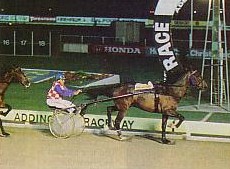| RACING HISTORY |
YEAR: 1993
FEATURE RACE COMMENT
 |
| David Moss convincingly wins the 1993 Dominion |
For Captain Odvaar Andersen, a trip around the world to watch his horse race for 12 seconds past four minutes at Addington was worth it. Especially when the horse was the $100,000 DB Draught Dominion Handicap, especially as he had never seen the horse win a race before, and moreso because he bred the horse from a stallion he imported from France 11 years ago. All this made the win by David Moss a poignant moment. The joy was shared by part-owners, the family of the late Harry Cox, whose son John has trained the horse for much of his illustrious career, though the training this season has been handled astutely by Robert Cameron.
David Moss was a warm favourite for the race, mainly on the strength of his second on Show Day behind Diamond Field. This looked the perfect tightener. He had, before that, won on the track, and his trial work had been all quality. From 10 metres behind, Cameron said he had not expected to be in front, where he was and stayed from the 2100 metres. "But I thought once I was getting round that I would use his ability. I wasn't too sure when Tony Herlihy came at me with Diamond Field after turning in just how much he had left, but he kicked again at the furlong and got there well," he said. David Moss has a record to match his impressive size. His win in the Dominion was his 19th from 57 starts, and took his earnings past $250,000.
Captain Andersen, aged 68, is now living in retirement in Oslo. He settled in New Zealand in 1966 after his appointment as consulate-general for Norway. He met the Cox family through an introduction from Peter Mills, then with the old stock firm of National Mortgage, during a visit to meet some shipping agents in Invercargill. His first acquisition was a pacing filly that neither he nor John Cox recall. But he later decided there were benefits for the New Zealand breeding industry to use the European trotters he so admired.
In the late 70's and early 80's he brought out four French stallions - Beau Nonantias (2:04.7), Gekoj (2:02.5), Iguassou (2:09.5) and Jet d'Emeraude (1:59.2) and the Norwegian horse Inter Du Pas (2:07.3). Gekoj was probably by far the best of them as a sire. He stood four seasons in Mid-Canterbury and left 83 live foals - 17 of them winners - before his death at the age of 19. In his first season at the stud he served Proud Countess, a mare by Hickory Pride that Captain Andersen had bought off Sir Roy McKenzie. Proud Countess was born in 1970, had her first foal in 1972 - to Pompano Flash in America - and was imported to New Zealand in 1974. Gekoj also sired Drott Moss, who tried twice to win the Dominion for Captain Andersen. The seafarer still has close relations to David Moss and Drott Moss in New Zealand. He is breeding from a sister to David Moss who has been served this season by Armbro Invasion. He is standing at stud in Southland Dahl Moss, a 9-year-old son of Gekoj and the Light Brigade mare, Jeepers Creepers. And he has Erling Moss, a 4-year-old three-quarter brother by Dahl Moss to Drott Moss he intends to race in Europe "if he is good enough."
The enthusiasm Captain Andersen retains for New Zealand, and its breeding industry, is mirrored in his plan now underway to stand the Super Bowl stallion Taylored Way with Cox next season. The winner of $250,000, Taylored Way is out of a Speedy Scot mare and took a 1:59 mark. He is 11 and served 30 mares this past stud season in America. "I think he is an ideal type to cross with some of the mares with French blood in New Zealand, and the three I have by Gekoj," he said. To illustrate his truly international interests, Captain Andersen in 1980 bought Robyn Tudor, a Tudor Hanover half-sister to Diamond Field from Grant Sim, and sent her to Norway where she is now breeding.
Game Paul made his contribution to give the result an overseas flavour by running third for his Australian owners, ahead of Idle Scott and Falstaff, the latter running the race of his life by finishing fifth after beginning the last 1000 metres with 10 in front of him. He tracked Diamond Field on his burst forward near the 800 metres, but found a torrid last half - which took David Moss 58.7 - just a little too hot to handle.
Credit: Mike Grainger writing in HR Weekly